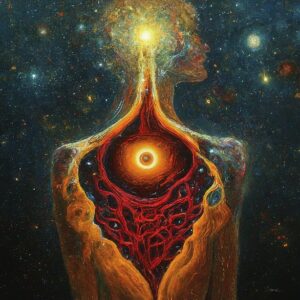
2. Everything that constitutes the “content” of being and determines all its properties is called matter. Matter is one! However, it is hypothetically possible to suppose that there are a multitude of forms of being of matter, and an infinite multitude of forms of manifestation of matter, since the instruments used by subjects for manifestation (the brain of observers, used devices, etc.) are different.
«The Universe consists of a single entity, which I call matter. This is unity, or monism.»
Konstantin Tsiolkovsky, “My Philosophy“, 1932
3. Being in all the variety of its manifestations is initially incomprehensible to people. Everything that is within the reach of human cognition in Being will be called the term Universe.
4. Almost everything that was created in the Universe, including man himself, was created not by people, but by someone else. People call this creator by name – Nature. People often replace the term Nature with other words-concepts, the use of which is always associated exclusively with their worldview, i.e. believers – in their own way, atheists – in their own way, philosophers – in their own way… Synonyms for the term Nature include many other words: Creator, Maker, God, etc. People created “with their own mind” and with their own hands. an insignificant part of the objects in the Universe.
5. Wishing to cognize something, a person preliminarily carries out the process of objectification, declaring some fragment of the Universe as a separate object. Successful realization of this process is possible only if a man through his “cognition slit” manifests a certain flesh, which has for him a “visible” (perceptible) “interface” formed by the difference in the degree of matter density of the cognized fragment of the Universe in comparison with the density of matter of its environment.
6. Many fragments of the Universe that have undergone the process of objectification are objects with bodies consisting of matter – a physical substance with a specific chemical composition, i.e. consisting of elements that are codified in the current version of the periodic table of chemical elements (Mendeleev’s table).
7. People call manifested flesh body.
8. There are no bodiless or incorporeal objects in the Universe! “Bodiless” objects simply cannot be distinguished by the subject from the environment around them. If the subject is able to reason about an object, then this definitely means that the subject was able to manifest the flesh (body) of the cognized object.
«The word “incorporeality” is not clear to me or to science yet. When incorporeal beings are discovered, then we will talk about them. After all, we agreed to talk only about the undeniable.» Konstantin Tsiolkovsky, Konstantin Tsiolkovsky, «Disputes about Monism».
9. All bodies in the Universe are created by the will of Nature, and not by themselves. Bodies that are created by people or other beings are created on the basis of flesh that was previously created by Nature.
10. The role of the “organizer of matter” initially belongs to Nature. All bodies in the Universe are initially “organized” by Nature and have a pre-installed mechanism for managing the resources of the flesh and for organizing its interaction with other objects of the Universe. This mechanism is an integral “part” of organized matter and is similar in its functionality to the concept of “operating system”, which is used by people in relation to computing systems. The mechanism used by Nature to control the flesh has been called the Soul since ancient times.
11. In case of decreased interconnection with the Soul, the flesh “loses” access to consciousness, the functioning of the flesh becomes unstable, the interaction of the flesh with the objects of the Universe becomes more complicated…..
Conclusions:
1. The Soul is an integral “part” of any flesh (organized matter), which performs the role of its “operating system”, providing stable functioning of the flesh from external influences, managing all its resources and organizing its interaction with the objects of the Universe.
2. All that Human being is capable of cognizing and all that Human being is capable of reasoning about has its Soul.
3. The device of the Flesh potentially determines the totality of the Soul’s capabilities:
-
The Flesh, which consists of simple substances, assumes the absence of nervous system in the flesh and allows the Soul to realize the minimum of its possibilities, i.e. the subject shows in the object cognized by it: complete absence or weak development of consciousness, complete absence or rudimentary development of mental abilities, absence of emotions, absence of will, etc.;
-
The Flesh, which consists of complex organic compounds of substances, presupposes the presence of nervous system in flesh and allows the Soul to realize many of its possibilities, i.e. the subject shows in the object he cognizes: developed consciousness with a significant amount of content, complex mental abilities, presence of emotions, presence of limited will, etc.
4. Accordingly:
-
As far as the Flesh is diverse in its complexity, so correspondingly diverse are their Souls in their capacities and abilities;
-
As far as the Flesh is developed, so potentially can their Souls be developed in their capacities and abilities.
5. Every flesh in the Universe is a primary active and systematizing factor, a potential carrier of consciousness, i.e. spiritual abilities.
